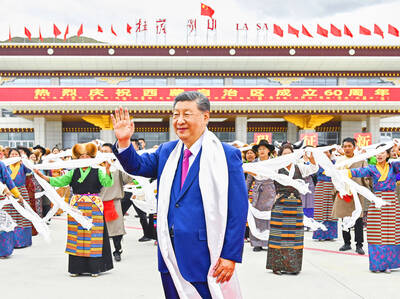Singapore has revealed it has been holding two more suspected Islamic militants for months and has slapped tight restrictions on 12 others, as it continues "mopping up the outer ring" of al-Qaeda-linked Jemaah Islamiyah operatives in the city-state.
One of the men in custody is Hosnay bin Awi, father-in-law of suspected Jemaah Islamiyah bomb expert Fathur Al-Ghozi, the home affairs ministry said in a statement issued late on Wednesday.
Hosnay was arrested in November, weeks after the Philippine army killed Al-Ghozi, who was the focus of a three-month manhunt after he escaped from police.
The other man in custody, Alahuddeen bin Abdullah, an alleged member of the Philippines-based Moro Islamic Liberation Front, or MILF, was arrested in October, 2002, the ministry said. The separatist rebel group is known to have hosted Jemaah Islamiyah training camps on the southern island of Mindanao.
The government did not say why it waited so long -- 15 months in Alahuddeen's case -- to announce it was holding the suspects.
Both were believed to have been involved in plots to attack western targets in Singapore, the ministry said.
"The inner core has been broken and disrupted," Home Affairs Minister Wong Kan Seng said following the announcement. "However, it would be naive of us to believe that we are out of the woods."
Both Singapore nationals were being held under the Internal Security Act which allows indefinite detention with annual nonjudicial reviews.
It said a dozen others -- 10 alleged members of Jemaah Islamiyah and two suspected MILF members -- had been interrogated and released on orders restricting their movements and actions.
Singaporean authorities have reached the stage where they are "mopping up of the outer ring of these [terror] networks," Wong said.

Ten cheetah cubs held in captivity since birth and destined for international wildlife trade markets have been rescued in Somaliland, a breakaway region of Somalia. They were all in stable condition despite all of them having been undernourished and limping due to being tied in captivity for months, said Laurie Marker, founder of the Cheetah Conservation Fund, which is caring for the cubs. One eight-month-old cub was unable to walk after been tied up for six months, while a five-month-old was “very malnourished [a bag of bones], with sores all over her body and full of botfly maggots which are under the

BRUSHED OFF: An ambassador to Australia previously said that Beijing does not see a reason to apologize for its naval exercises and military maneuvers in international areas China set off alarm bells in New Zealand when it dispatched powerful warships on unprecedented missions in the South Pacific without explanation, military documents showed. Beijing has spent years expanding its reach in the southern Pacific Ocean, courting island nations with new hospitals, freshly paved roads and generous offers of climate aid. However, these diplomatic efforts have increasingly been accompanied by more overt displays of military power. Three Chinese warships sailed the Tasman Sea between Australia and New Zealand in February, the first time such a task group had been sighted in those waters. “We have never seen vessels with this capability

A Japanese city would urge all smartphone users to limit screen time to two hours a day outside work or school under a proposed ordinance that includes no penalties. The limit — which would be recommended for all residents in Toyoake City — would not be binding and there would be no penalties incurred for higher usage, the draft ordinance showed. The proposal aims “to prevent excessive use of devices causing physical and mental health issues... including sleep problems,” Mayor Masafumi Koki said yesterday. The draft urges elementary-school students to avoid smartphones after 9pm, and junior-high students and older are advised not

Chinese President Xi Jinping (習近平) attended a grand ceremony in Lhasa yesterday during a rare visit to Tibet, where he urged “ethnic unity and religious harmony” in a region where China is accused of human rights abuses. The vast high-altitude area on the country’s western edge, established as an autonomous region in 1965 — six years after the 14th Dalai Lama fled into exile — was once a hotbed for protest against Chinese Communist Party rule. Rights groups accuse Beijing’s leaders of suppressing Tibetan culture and imposing massive surveillance, although authorities claim their policies have fostered stability and rapid economic development in